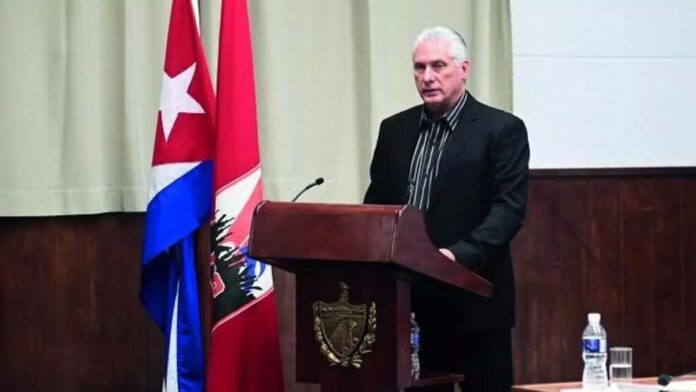
“The optimists, the group in which we revolutionaries belong, believe that the important thing is to have conquered the test,” said the president, without specifying what that supposed victory is.
By 14ymedio
HAVANA TIMES – In response to Cuba being kept on the US list of countries sponsoring terrorism for another year, President Miguel Díaz-Canel has called for a “march of the fighting people” on December 20. In his speech this Friday, on the second and final day of the Plenary Session of the Central Committee of the Communist Party (PCC) – a speech described by the official press as “rich in reasons, enlightening on possible paths, with a scope that generates emotions” – the president lashed out against the “imperial blockade” and “the unjust inclusion of Cuba on the list of countries supposedly sponsoring terrorism.”
Before reaching that point, however, the speech began vaguely. “Another tremendous year is about to end. The pessimists will say that it could not have been worse. The optimists, the group in which we revolutionaries are militant, believe that the important thing is to have overcome the test. And the lessons it leaves us,” said Díaz-Canel, without specifying what this supposed victory consists of when, at the same time, the Plenary session of the PCC recognized the “complex moment” that the Island is experiencing.
The president also said that the “most recent electoral result in the United States,” which gives Donald Trump a second presidency, “did not surprise us, just as we are not surprised by the euphoric dance of the haters, desperate to celebrate the end of the Revolution that they have not been able to defeat.”
His forceful words, however, barely concealed his usual voluntarism*: “We will overcome the current difficulties with creativity, by strengthening development programs based on talent, innovation, work and creative resistance.”
The concept of the “march of the fighting people” is the work of Fidel Castro, who used it for the first time in 1980 to name the pro-government demonstrations against the Cubans who stormed the Peruvian Embassy in April of that year and whose action gave rise to the Mariel exodus [also known as the Mariel Boatlift].
Those demonstrations became a sadly famous chapter in recent history on the island because they included aggressive slogans such as “Get rid of the scum!” and the derogatory use of the term “worm” to describe those who wanted to emigrate to the United States. Those days were also marked by physical violence and hate rallies organized in schools and workplaces against those who declared their intention to leave the country.
According to EcuRed, more than a million Cubans participated in those demonstrations, a figure that the regime has not been able to attract with its calls for a long time, among a population increasingly diminished by apathy, discontent and unstoppable migration.
—–
Translated by Translating Cuba
*Translator’s note: The principle of relying on voluntary action (used especially with reference to the involvement of voluntary organizations in social welfare) – Oxford Dictionary
Read more from Cuba here on Havana Times.




